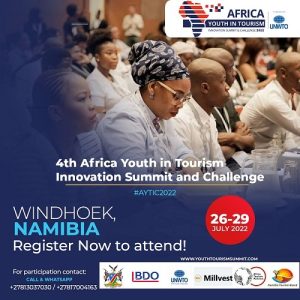Johannesburg, March 20 (BSHD NGO)-The Acting Executive Director of the Regional Tourism Organisation of Southern Africa (RETOSA), Simba Mandinyenya is of the strong view that tourism should not be affected by politics,but should be used as a tool to promote peace, encourage openness among nations and allow people to visit each other.
When Mandinyenya first joined this tourism arm of the Southern African Development Community (SADC)in August 2009 as the Research, Planning and Development Director – a position which he still holds – there was a pending issue which threatenedthe success of the organisation.“Failure by African leaders to recognize and appreciate the importance and role of RETOSA as a SADC tourism organization” threatened to uproot the very foundation of the regional organisation.
This was despite the fact the RETOSA was founded and is subscribed to by 15 Southern African Member States, namely; Angola, Botswana, Democratic Republic of Congo, Lesotho, Madagascar, Malawi, Mauritius, Mozambique, Namibia, Seychelles, South Africa, Swaziland, Tanzania, Zambia and Zimbabwe.
In June 2012, when Mandinyenya took over as the Acting Executive Director he knew he had a challenge ahead of him as the future of the organisation that was founded with the primary objective to facilitate and promote the development of equitable and ethical tourism throughout the Southern African Region was uncertain. He knew that the future of the organisation which he believed was capable of increasing tourist arrivals to the region through sustainable development initiatives, improved regional competitiveness, and effective destination marketing rested upon him.Hence he was not just about to watch the organisation dissolve.
As “the main promoter of a country is its leader” and as “tourism cannot be separated from politics” Mandinyenya applied his research skills into finding solutions that would convince SADC Member States that RETOSA was not merely an organisation that duplicated efforts carried out by Ministries of different Member States but that it was in fact an organisation that could effectively coordinate such efforts for inclusive regional benefits.
“An organisation like RETOSA is positioned to play a critical role in the socio-economic development of the region; in regional integration, development and poverty alleviation,” said Mandinyenya.
Hence, to save it,strategicallyraising awareness became his immediate task.
“I realised that what was lacking was the awareness of RETOSA’s existence as the central player in marketing the region’s unappalled tourism resource across the world – its seas, beaches, the Big Five, the flora, and the fauna among others,” he said. Sad was the fact that this lack of awareness was not only among political leaders but also among other people with very high positions within the sector.
“They also lacked knowledge of the strategic nature of tourism in the socio economic development and potential integration of the region as one tourism destination.”
To strengthen his organisation and rid it of confusion among many of what it really was mandated to do, due to a lack of clear direction and a common vision among Member States, the Acting Executive Director also came up with a vision and mission which he aligned to SADC’s 2027 Regional Infrastructure Development Master Plan as he believed that without infrastructure development, tourism cannot fully contribute to Southern Africa’s economy.
“What was more important was not tourism isolating itself because it cannot, it’s linked to everything that’s controlled by governments. When you look at countries it is the president of the country who is chief public relations officer of the country. In this sense from the tourism angle the main ambassador, the main promoter of the country is its leader so the politics of the day usually tell us whether the country is a good tourism destination to promote or not,” said Mandinyenya. “Citing that the biggest challenge became raising awareness at all levels right up to the leader of the country on the importance of tourism.”
To raise this awareness and subsequently save RETOSA from nose-diving Mandinyenya implemented various strategic approaches.
Youth in tourism conference and youth in tourism essay competition
“We now have an initiative targeting school children because we believe that they must be awareness even at that level. We know that for parents to go to a particular destination they want to see whether that destination is conducive for the kids and kids also get to choose a destination,” he said.
Targeting vulnerable groups
Driven by the knowledge that politicians respond to the needs of their constituencies, he targeted constituencies and created awareness, and introduced capacity building programs. “Here we have programs that are looking at the youth in tourism, women in tourism, and those that are looking at community based tourism. Beyond that we look at issues of sustainable tourism,” he said.
Developing an online tourism course
In partnership with an organisation called Youth in Tourism Hospitality Institute as well as Lugano University in Switzerland, RETOSA this year developed an online course on tourism for kids.
“It’s a yearlong self-assessment course, the computer will tell the student whether he or she has passed. The course is free,” said Mandinyenya. Adding that they are developing a mobile application which students can use to log in and out of the system.
“This course will enable students to learn about sustainable tourism and will be linked to national curriculums. In this regard it will also help them pass their pass high school exams. At the end of the year we will pick the best student who will then come forward to compete through presentations,” he said.
Women in tourism conference
We have since crated a steering committee at the regional level and want to create chapters that fit into the regional structure. “This will enable us to identify gaps and assess the role of women at national and regional level, particularly concerning capacity building which is the biggest challenge always,” he said.
Establishment of a regional sustainable tourism forum
At the upcoming annual Indaba; Africa’s top travel show to be held in Durban, South Africa from the 9th – 11th of May 2015, Mandinyenya said they are going to establish a Regional Sustainable Tourism Forum. People who will sit on this forum are people responsible for sustainable tourism at national level, people who are responsible for initiating programs on sustainable development among other responsibilities in their respective countries.
International Cooperation Partners
A destination like Southern Africa which still has poverty and underdevelopment issues, needs foreign investments – funding and technical support – in certain aspects. “Currently we have a Japan International Cooperation Agency (JICA)personal housed here at RETOSA to assist us in the field of community tourism. We are also working with the World Bank to establish the UNIVISA, and we are also working with capacity building agencies like Exchange and other regional bodies like Fair Trade Tourism, and the United Nations Environmental Program (UNEP) on sustainable tourism among others,” he said. These partnerships are meant develop the product and promote market access. Enditem.





